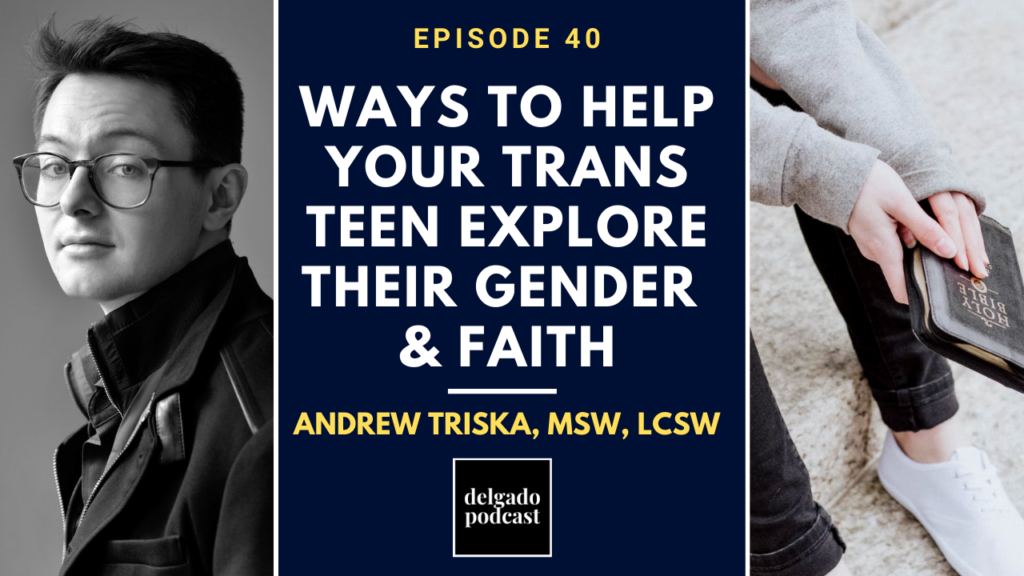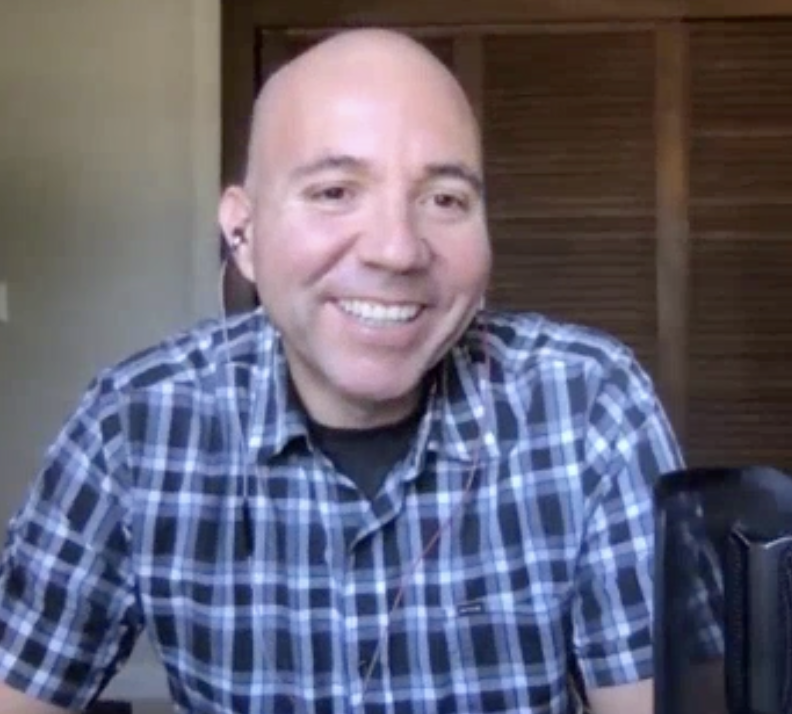
What should you do if your teen comes out as transgender? What are ways to support them in their transition, while also helping them grow in their faith?
Many parents struggle to understand ways to support their their transgender teenager, especially if they think that it’s just a phase of gender exploration, or a mild form of gender dysphoria that will eventually resolve.
A parent may further struggle on how to care for their trans youth if they belong to a non-affirming religious community, which may exclude their teen from participating in important spiritual activities (e.g. communion, confirmation, mitzvahs) and/or gender-based ministries. Sadly, some of these religious communities may further harm trans youth with transphobic teachings and political agendas aimed to hurt the transgender community.
All of this can lead trans youth to feel unaccepted, unloved, and less likely to continue in their faith journey.
This is why it’s important for parents and spiritual leaders to be aware of the prejudice, discrimination, gender harassment, and barriers faced by transgender youth so they can learn ways to help.
Here are some distressing statistics:
Transphobic Violence : 43% of transgender youth have been bullied at school, compared to 16% of their non-LGBTQ+ peers (HRC). 29% of transgender youth have been threatened or injured with a weapon on school property, compared to 7% of cisgender youth (HRC, CDC). And 47% of all transgender people have been sexually assaulted at some point in their lives (NSVRC).
Mental Health: Transgender people are six times more likely to have a mood or anxiety disorder than the general population (Yale School of Public Health, 2020). Depression rates are also exceedingly high in people who do not identify with the gender they were assigned at birth, and as many as 30% of transgender teenagers attempt suicide (Nature, 2019).
Homelessness: Up to 40% of the 4.2 million youth experiencing homelessness identify as LGBTQ+. Those who identify as lesbian, gay, bisexual, transgender, or questioning have a 120% higher risk of experiencing some form of homelessness (National Network for Youth).
Religious Prejudice & Discrimination: The majority of LGBT Americans report that certain religious institutions, particularly Islam (84%), the Mormon church (83%), the Catholic Church (79%) and evangelical churches (73%) are unfriendly toward transgender people (Pew Research, 2015). 72% of Protestant pastors believe that it is morally wrong for an individual to identify with a gender different from the biological sex they were born with (Lifeway Research, 2021).
So what are ways for parents to help care, protect, and support their trans kids?
In this week’s podcast, we chat with Andrew Maxwell Triska, MSW, LCSW about ways for parents to support and affirm their trans teen. Andrew is a trans-identified psychotherapist, educator, and author who works with trans and queer youth and adults. Triska also trains and consults on gender identity and sexuality for organizations, corporations, and schools. His fantastic new book “Parenting Your Transgender Teen: Positive Parenting Strategies for Raising Transgender, Nonbinary, and Gender Nonconforming Teens” is designed to help parents actively support and affirm their trans youth along the journey.
Here are video clips from the discussion:
• Advice for shocked parents of trans teens
• Anxiety, fears, and doubts of parents with trans youth
• Fears of desistance (or de-transitioning)
• Gender dysphoria & dangers of “conversion therapy”
• How to affirm your teens at home
• Struggling with pronouns and name changes
• Advocating for your trans teen at school
• Telling friends, family and non-affirming people about your trans kid
• Ways to protect your trans kids from harmful social media content
• Advice for religious parents of trans teens
You can watch the full video conversation on ways to help transgender teens here.
You can download or listen to the conversation here:
You can also download this episode on iTunes, Spotify, Google Podcasts, Stitcher or YouTube.
At the end of the podcast, I share the following seven ways parents can take Triska’s trans-affirming strategies and apply them into religious households.
1. Use Their Pronouns in Prayer: Affirm your kid’s gender identity in personal and family prayers by using the pronouns and/or name they requested. This is how your prayers will not only provide gender affirmation, but also a spiritual blessing.
2. Get Spiritual Direction: Seek out a trans-affirming family therapist (wpath.org) and spiritual director to assist you with the emotional and spiritual issues that you may be feeling. Proverbs says “Where there is no counsel, the people fall; but in the multitude of counselors there is safety (11:14)” It might take time for you to find the right counselors, so talk with a few until you find the best fit for your family.
3. Seek Forgiveness: Some parents of transgender teens can be overprotective, pessimistic or will obsessively worry, which can lead to more anxiety and stress in the home. Model humility by seeking forgiveness from your trans kid when you misgender them, make mistakes, or cause them more distress.
4. Study Transgender Theology: Get educated on ways transgender people find encouragement and blessings in your religious tradition, and discuss these inspirational scriptures, texts, and/or stories at home with your trans kid. Christian families can find some helpful transgender resources at ReformationProject.org. Muslim families can find helpful gender diversity resources at the Muslim Alliance. Jewish families can find resources at the Institute for Judaism, Sexual Orientation and Gender Identity at Hebrew Union College.
5. Give to Faith-Based Trans-Affirming Orgs: Financially support and/or tithe (give alms) to faith-based transgender organizations that support, affirm, and advocate for trans people (e.g. Muslim Alliance, Transmission Ministry Collective, Keshet and JQY: Jewish Queer Youth).
6. Listen to Transgender People of Faith: Transgender people of faith have been sharing their important stories in books, podcasts, and social media. Check out “Transforming: The Bible and the Lives of Transgender Christians” by Austen Hartke, “Among the Eunuchs: A Muslim Transgender Journey” by Leyla Jagiella, and “Through the Door of Life: A Jewish Journey Between Genders” by Joy Ladin.
7. Lead Your Trans Teen with Humility & Compassion: Pray that you would display the love of God to your transgender kid as you lead them with wisdom, compassion, and humility. You will both have disagreements in the future, so it’s important that they know that your decisions are grounded in love and compassion.
All of these step can help your trans teen see that their gender identity doesn’t separate them from their spirituality and/or faith.
On the podcast, Triska also discussed a variety of religious organizations that support the transgender community with their faith traditions. Here are some of those organizations:
Christian: Gay Church maintains a directory of LGBTQ-affirming Christian churches searchable by address. Queer Theology (queertheology.com) provides resources to help LGBTQ Christians and their families embrace their sexuality and gender identity. Their resources on trans identity and Christian theology can be found at queertheology.com/transgender.
Muslim: The Muslim Alliance for Sexual and Gender Diversity (muslimalliance.org) is an organization that advocates for LGBTQ Muslims. Advocates for Youth (advocatesforyouth.org) has produced a guide for young Muslims who are questioning their gender called “I’m a Muslim and My Gender Doesn’t Fit Me: Resources for Trans Muslim Youth.”
Jewish: Eshel (eshelonline.org) is an organization in New York City that provides support to Orthodox Jewish LGBTQ people and their families. They maintain a warmline at 1-724-374-3501. Keshet (keshetonline.org) is an organization that promotes LGBTQ equality in the Jewish community and offers resources and events. TransTorah.org is a site about Jewish texts and traditions that may help you find clarity about how your teen’s identity might fit with your Jewish faith. Congregation Beit Simchat Torah is a welcoming synagogue in New York that maintains a resource page for transgender Jews at cbst.org/transjews. Other resources can be found at pflag.org/jewish.
And check out these trans-affirming organizations:
• WPATH: World Professional Association for Transgender Health
• TransYouth Family Allies
• Stand with Trans
• Gender Spectrum
• PFLAG
Here are some other helpful tips from Andrew Triska’s book:
“Sometimes parental concerns can come across as invalidation. Your concerns might be perfectly understandable — What’s your future going to look like? Aren’t you afraid of getting bullied? What are the risks of medical intervention? — but the way you express them might be heard as discouraging or dismissive. Before you ask a question, think about why you’re asking it? Are you asking this question to deepen your understanding, or are you trying to dispel your own anxieties?”
“Your child is dealing with enough negativity from the media and outside world. Make your home a safe space. Don’t be a pessimist. Instead of telling your child they have a long and limited road ahead, tell them their future is bright with no limits on what they can accomplish or who they can be.”
“Although going through the process of gender exploration might mean your teen needs extra understanding and patience from you, it doesn’t mean you can’t have limits on your teen’s behavior. The rules of the house are still in effect. Do think about why the boundary is there. Are you enforcing this rule for household members’ well-being, or because this was a boundary in your own family you never questioned? If the boundary exists for a reason, make sure your teen know what you expect them to demonstrate empathy and awareness of the people around them by respecting it?”

